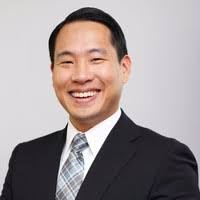Post-JET Panic & Paving My Path: Finding the Right Graduate Program with Middlebury
********
********
Posted by: Margie Banin (Kochi, 2005-2007), a former CIR with a love of the written word. Currently she connects others to Japan through translating, writing, and editing texts on Japan. Margie also manages the JETwit Bluesky account, serves as the JETwit Volunteer Coordinator and a JETwit jobs-list welcomer, and engages in various other JETwit outreach activities.
_______________________________________________________________________________________________________
Did you know JET alumni are eligible for scholarships at various educational institutions, including Middlebury Language Schools, through USJETAA’s university partnerships? JET alum Sydney Michael shares her experience taking advantage of this opportunity here.
Authored by Sydney Michael (Yamaguchi, 2019-2024)
“What are your plans for after JET?”
Many JET alums can recall the confusion and “now what?” feeling after deciding not to renew their contracts or hitting the maximum number of years on the program. I know many JETs, myself included, struggled not only with what specific institution to go to, but what to do in general: to work, to continue in higher education, or something else entirely. Hearing from others was incredibly beneficial when trying to decide on my post-JET path, and I hope my story can be helpful to others in the same way.
From the Classroom to the Office
I knew before graduating college that I wanted to participate in the JET Programme. In addition…click here to read the full article on the USJETAA website.
From JET to Kumano Adventures: Even with a liberal arts education, more generalist than I ever would have imagined
***************
Todd Van Horne (Wakayama-ken, Tanabe-shi, 2004-08) is an inbound tourism specialist based in Wakayama Prefecture. He is Operations Manager for Kumano Adventures, a company started by fellow JET alum Giuliana Alfinito (Wakayama-ken, 2017-18), who also previously served as President of the New England JETAA chapter and as a Country Representative for JETAA USA.
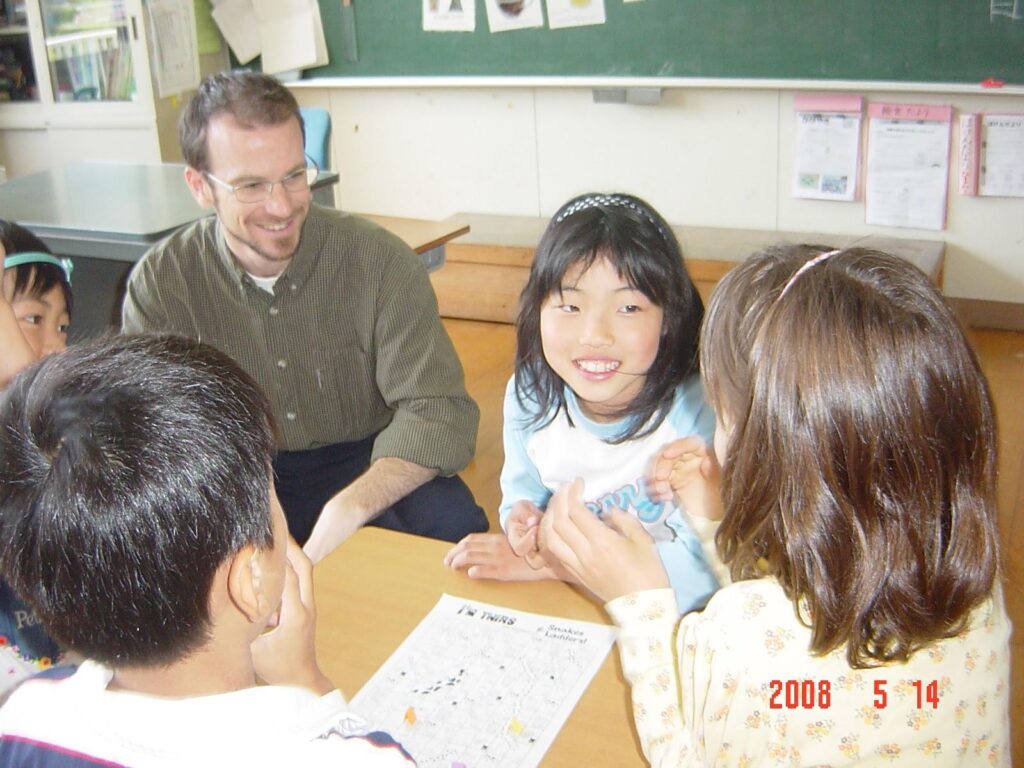
I was an ALT in Tanabe City, Wakayama, from 2004 to 2008. It was my 2nd time in Japan and I was a little older than most of the other ALTs. I didn’t have so many shared interests with the JET social world around me, so I found myself spending time with a small group of friends exploring the area, cooking, and studying the language hard on my own.
My placement itself was difficult, sometimes unpleasant, for reasons that probably wouldn’t surprise other JET alumni. In fact, I had my resignation letter typed and translated, and was about to turn it in after recontracting, when suddenly on that day we were assigned a new supervisor. The new supervisor was just as disconnected but much less unpleasant. With my growing independence thanks to improving language ability and understanding of bureaucracy, I could rely less on colleagues I preferred not to depend on. That growing independence was the reason I was able to stay for 4 years. It’s still very strange to me that the life I have now pivoted on that day’s “I’ll see how today goes.”
Outside of work, I became increasingly interested in fermented foods and helped my wife grow and teach her cooking class business.
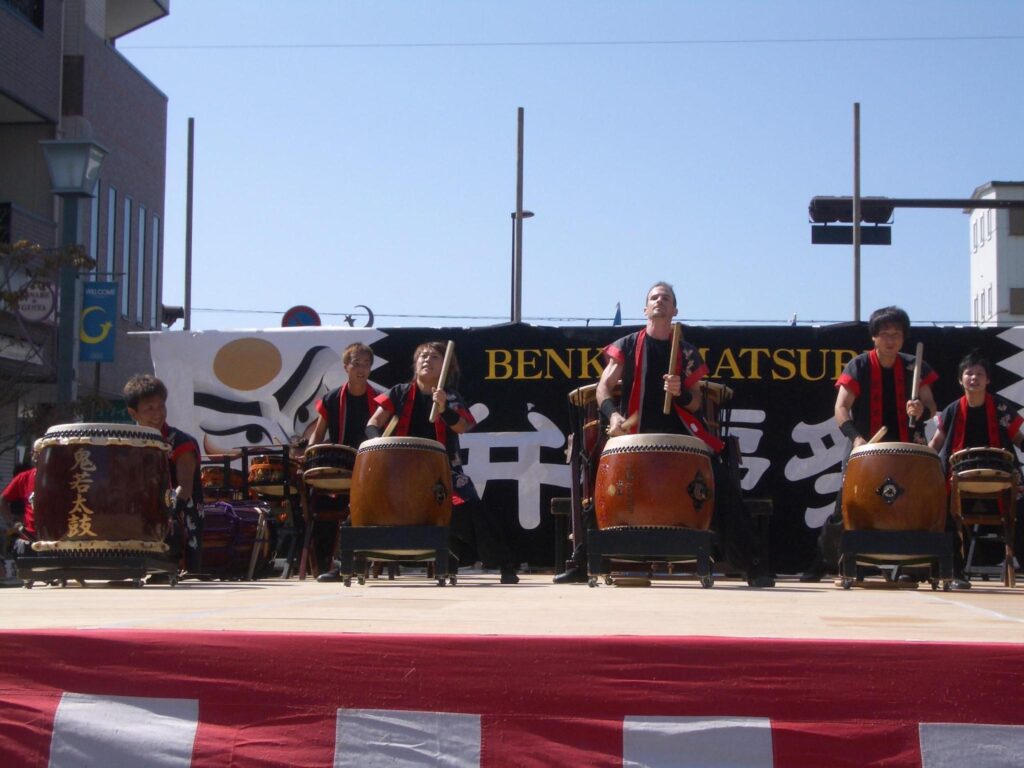
After JET, the plan was to move to the U.S. for a couple of years and then return to Japan. We did exactly that, only to move back just one month before the 2011 tsunami. Like nearly everyone we knew at the time, we struggled during that time. Finally we got our restaurant open, focusing on fully handmade food served with homemade pickles, miso, and sprouted brown rice.
We ignored the naysayers who said you shouldn’t work with your spouse … and paid the price. We had a restaurant, a baby, an immediate family member in failing health, and more. To say it was a tough time is a vast understatement. For a few years I felt like the guy in movies clawing at ice from underwater, trying to find a way out.
A combination of circumstances led to an introduction to a local company, and although I wasn’t looking to be employed, it was the most practical option for a few years. I’m glad I did it, but I would never, ever repeat it. Although staying with the restaurant wasn’t an option at the time, my only keen regret about these 20+ years is that I’m not producing and selling my food and products anymore.
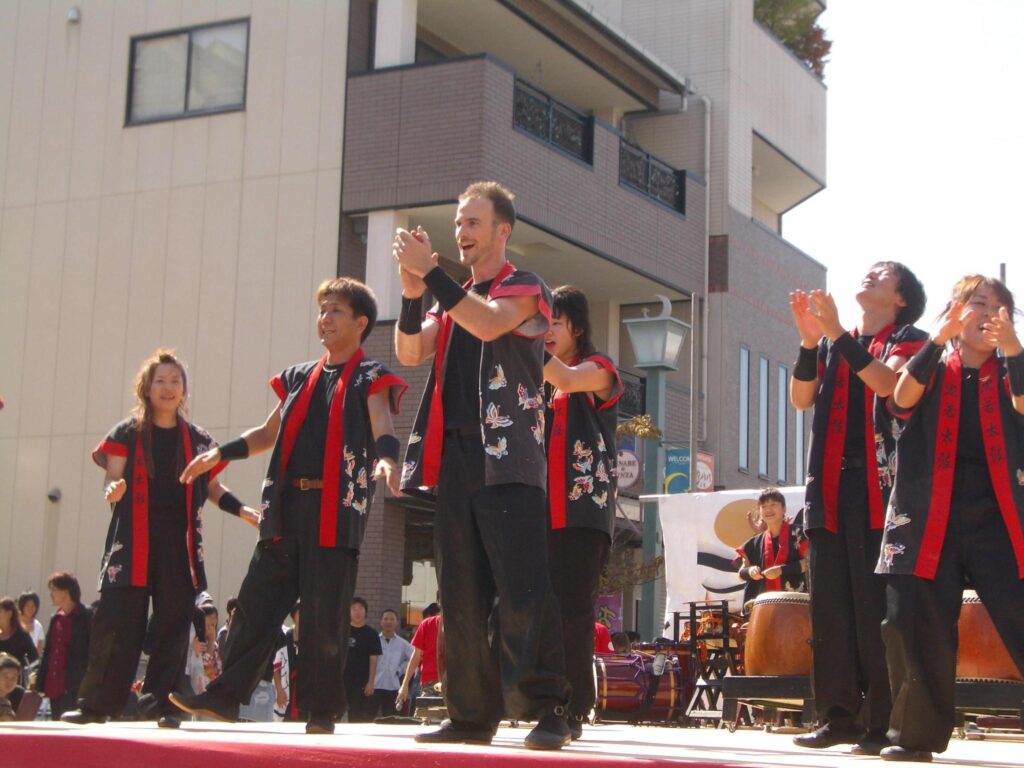
Becoming a parent changed things again. After my daughter was born, I developed a strong interest in the psychology and theory of parenting, likely influenced by my years in education. I separated from my ex-wife, quit that job, and found myself with the space to be the kind of father I wanted to be. My somewhat frustrated interest in education was rocked when I started raising my daughter. It was like a light bulb turning on, to coin a phrase. I began coaching Japanese parents in raising bilingual children, with a lot of parenting philosophy mixed in. It was meaningful work, and was aligned with my values and interests. I randomly met an old friend in a supermarket around that time and recall saying, “I’ve been through the f****** ringer but I’m so happy to be where I am.”
Around that time, a former JET coworker introduced me to Giuliana, who had been a JET in nearby Shingu City from 2017–2018. We hadn’t crossed paths before, unsurprising, given that I was working six days a week during her year on JET. I started helping her informally with operational challenges for her small travel startup Kumano Adventures, and over the course of a year or two, that collaboration deepened. When an opportunity came up to apply for a tourism promotion grant, we decided to partner.
In 2025, we both quit our other jobs and committed fully to Kumano Adventures.
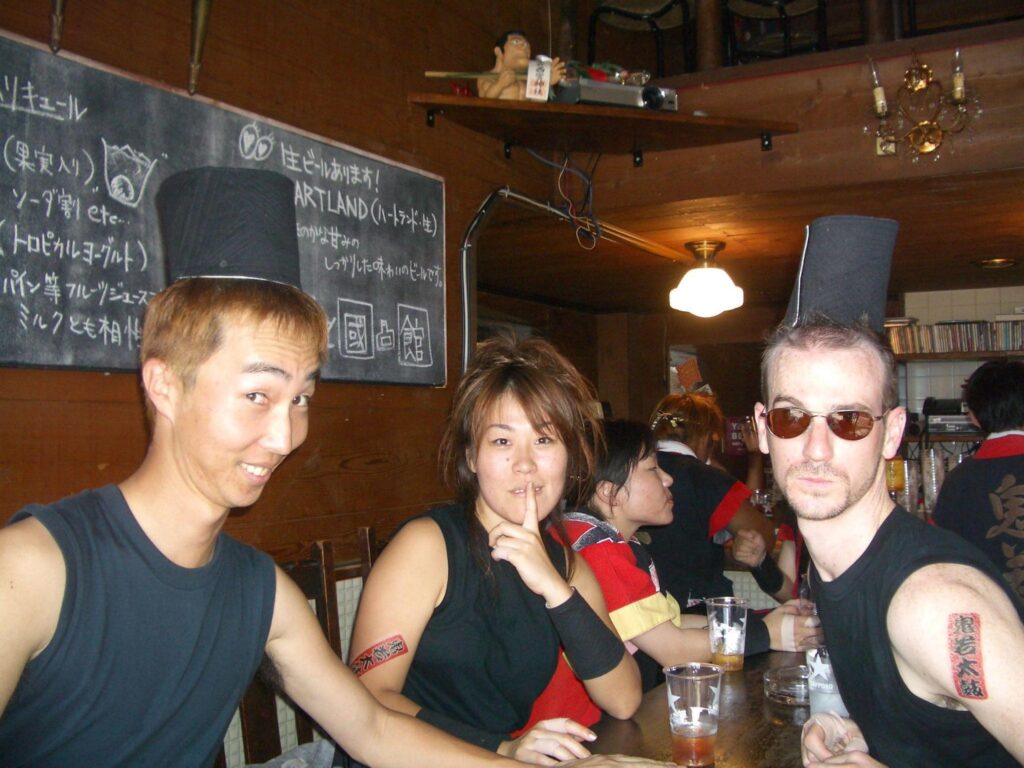
Running a tour business in rural Japan is loads of fun but feels Sisyphean at the same time. I love connecting with local suppliers who are eager to try new ideas, and seeing what we can create together. With so many inbound tourists, sometimes I feel like we’re passing on earning opportunities too often. But our end goal is to create systems that help rural Japan, while making a living. The challenge is being creative and persistent, but also patient in balance, while finding where our vision overlaps with what the consumer base is actually looking for.
One project that feels especially full-circle for me is our Taiko Retreat. During my JET years, I played in the local taiko group for four years. Separately, the partner of another local ALT, Carrie, also began playing and teaching taiko here and has continued ever since. Carrie later reached out about creating a taiko event back in the place where they were placed for JET, and that conversation eventually became the Taiko Retreat.
Carrie is a dance teacher with a strong focus on physical health and incorporates concepts like godai, the five elements of Eastern philosophy, into her teaching. From my perspective, Carrie’s work emphasizes authenticity at both the personal and student levels while creating a space where people can express themselves honestly. We hope this becomes a recurring event.
For former JETs, there’s something familiar about returning to rural Japan not as a teacher, but as a participant, already knowing how to perceive the pause, open your senses, be thoughtful about your response. As a small way of welcoming that community, we offer a 10% discount for former JET participants.
Recently my friend invited me to his Thanksgiving gathering. During dinner he looked at me and said, “You don’t seem jaded about your time here.” Well … I’m glad that’s my vibe!
Although life’s difficulties never disappear, things are easier for me here now than they’ve ever been. My time in this region started with JET but I wouldn’t really call it a foundation. It was just another experience that had good and bad times, and was part of the path to now.
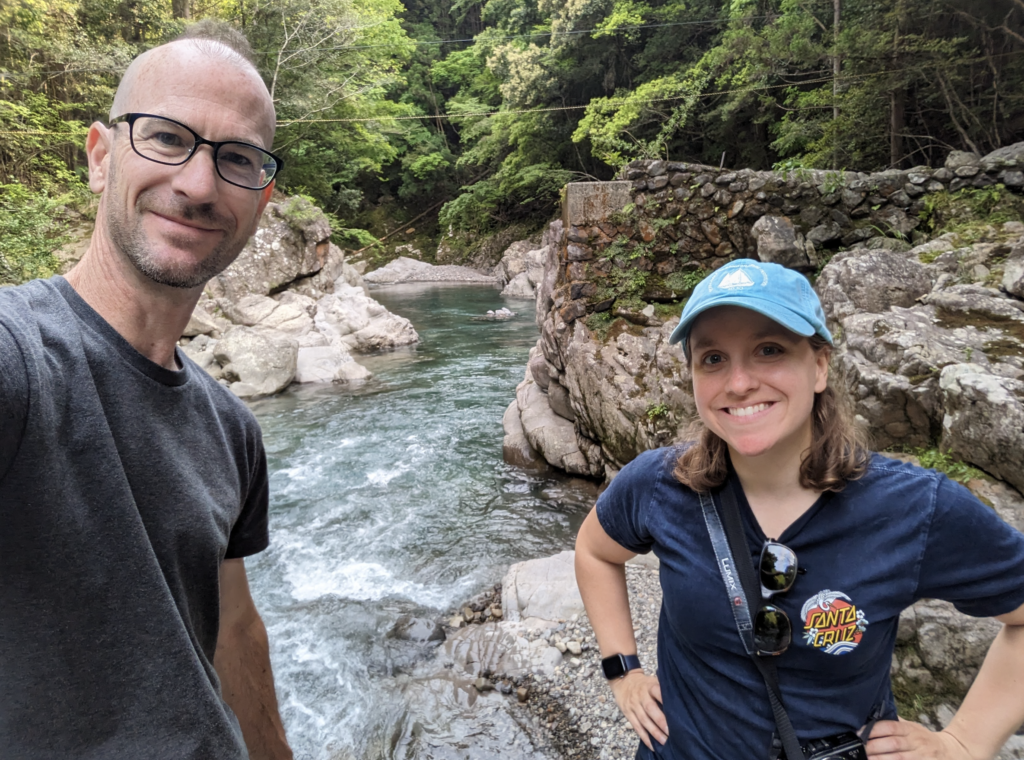
Summary of Responses to the JETwit Community Survey from March 2025
This is the first contribution from Cameron Cayer (Yamagata-ken, 2023-25). Originally from Rhode Island, then university in Washington, DC, he is currently taking the “long way home” through East, Southeast, and South Asia. Currently reporting from Flores, Indonesia.
Note: Here is a new Google Form for anyone who would like to submit their own response after reading this article, or for anyone who would like to share a reaction to this article.
The year 2025 has been one of major upheaval and change. There have been significant shifts in many US policies, massive government restructuring, and wide-ranging budget cuts budget changes. How have these changes impacted JETs and JET alumni? Earlier this year, JETwit reached out to the JET alumni community to conduct a survey to ask former JETs how, if at all, they have been affected. Nearly 100 JET alumni responded, and below is a summary of themes and some quotes from the responses.
The data undoubtedly reveals that U.S. federal budget cuts and policy shifts have created a climate of widespread anxiety and uncertainty among current and former JET Program participants. While the immediate effects vary, a clear pattern of professional and personal instability has emerged from the community’s responses.
Direct Professional Impact: Layoffs and Lost Opportunities
For many, the policy changes have resulted in direct job losses and a stalled career trajectory.
- Several federal contractors and government employees reported being laid off due to canceled contracts and the defunding of entire departments. One respondent noted, “All of our U.S. government partners have been fired or furloughed.”
- Non-profits and international organizations are also heavily impacted. One individual stated, “My agency has had grants canceled by our funders and our clients have had to cancel contracts with my team because their grants were rescinded.” This has led to staff restructures and layoffs.
- Academia and education have not been spared. Cuts to federal grants (e.g., NIH) have led to hiring freezes, rescinded job offers, and budget cuts. An art teacher expressed concern that their job would be eliminated, as “the arts are always the first to go when there’s a funding shortfall.”
- Opportunities for advanced education and career development have been significantly reduced. Several key international education programs, including Fulbright and the Critical Language Scholarship, have been halted or defunded. One person shared, “I have lost 2 internship opportunities this spring.”
Widespread Personal and Economic Disruption
Beyond professional impacts, survey responses indicated a potentiallyheavy personal toll on the JET community.
- There is a pervasive fear of a looming recession. One former JET who now owns a small business remarked, “The future is quite uncertain and my clientele are generally fearful and often ask if my prices will increase.”
- Many are reconsidering their plans to return to the U.S. One respondent said, “I’m not going to be able to return to the US this year after all because I simply can’t get a job in the US.” Another person, still on JET, feels “trapped” but also grateful for their stable position in Japan.
- The stress of the political climate is a major concern. Individuals are experiencing increased anxiety. As one person put it, “The rhetoric of the current administration is rotten to the core.”
Impacts on Marginalized Communities
For some, the policy changes and political rhetoric are not just a matter of professional worry but a fundamental concern for their safety and well-being.
- Attacks on DEI initiatives and anti-immigrant rhetoric have created a climate of fear. A transgender person said, “I feel I have an added pressure to stay [in Japan] longer to stay safer and be able to access my hormones”.
- Many feel that their rights and safety are at risk. One respondent, a first-generation immigrant, shared their fear “of going back since I’m not sure what the current administration will do to me as a 1st generation immigrant who came to America as a child.”
Waiting and Seeing
It’s worth noting that some respondents indicated no direct effect as of the time of their response.
A Note of Optimism
Not all views were negative. Some respondents expressed a positive outlook on the policy changes.
- One individual felt that the government was “addressing the most basic, foundational matters relevant to every American” for the first time in their life. This person was happy with the new administration’s focus on reducing “bloated bureaucracy” and addressing the national debt.
- Another respondent expressed relief that there is now a “focus on economic growth again” to ensure job security and a reasonable cost of living.
- An individual who owns a business helping people relocate to Japan has seen a “huge spike in interest” from people looking to “go back to Japan,” which they found satisfying.
- One respondent noted that if the administration follows through on its promise to remove the foreign-earned income tax, it would be “extraordinary and the first time a president has enacted legislation that would immediately benefit my life.”
For many, the experience of living abroad has even reshaped their perspective on what “home” truly means. As one respondent said, “It’s a country that I no longer recognize, leaving me feeling like an expat with no true ‘home.'” And as mentioned above, others are seriously considering staying in Japan, as they feel unsafe or unsure about returning to the U.S.
Thank you to everyone who participated in this survey!
Comments or reactions to this article? Want to tell us how you’re doing or how 2025 has affected you? Please feel free to submit your comments through this Google Form. We plan to do a follow up article in the coming months that will include new responses.
After JET: From JET to Promoting Japanese Brands Overseas
Melinda Kaneko (Saitama, 2011–2016) is a Digital Marketing and Content Localization Specialist who has been working with Kyoya Dye Works for two years. (By the way, if you would like to take part in a giveaway for some of their hand-dyed indigo fabrics, check out their website here.)
I was drawn to the JET Program to completely break out of my comfort zone and experience Japanese culture and language from an immersed perspective—not just from the anime and J-dramas I watched in college. Life in Japan was a constant adventure, and a humbling one at that. When communicating with my students and coworkers, what I wanted to say was not always what I ended up saying, and not always how I was heard. The reality of life through the lens of language and cultural differences challenged everything I thought I knew.
While navigating these challenges, I was fortunate to have an incredible support system within my Board of Education and among my fellow ALTs. We formed a tight-knit community, exploring the country, going to festivals, learning the art of tea ceremony, joining local cooking clubs, and even conquering Mt. Fuji—everyone needs to try it once, right?
The Universal Question
I struggled with the universal question every JET faces: what to do after the program ends? After five years, all I knew was that I didn’t want to leave. From the poetic “Engrish” on shop signs to the 1,000 sakura trees in my local park, to a Japanese family that would become my in-laws two years later—Japan had woven itself into my life in countless ways.
The easiest path would have been to continue teaching, but I yearned for a new challenge. I scrambled to find a creative job that would let me explore more of Japan, where I could speak English and Japanese, and that would allow me to grow and develop both personally and professionally.
Unexpected Career Path

At the very last minute, I stumbled upon my current company: a Japanese marketing agency that helped other Japanese businesses promote their products and services overseas. It was perfect. Our clients sell things that are uniquely Japanese, using traditional techniques that have been handed down for generations, ranging from hair products and shibui clothing to carpentry tools and washoku.
The proofreading skills I gained as a former ALT and graphic design skills I picked up for the AJET Connect Magazine were immediately useful. I quickly expanded them to include translation, SEO, copywriting, project management, and conducting user interviews for a variety of clients. It was the perfect fit—I could stay in Japan, be with the people I loved, and develop a completely new skill set.
Connecting with Culture Behind the Scenes
While my days as an ALT are over, my work still lets me live and breathe Japanese culture every day. My role as a translator and localization specialist is a continuation of the cultural ambassadorship we were all tasked with on JET. Just as I had to simplify and break down my experiences for my family back home who had never been to Japan, I now do the same for the brands I work with. Localization goes beyond direct translation—it’s about finding the perfect English phrases to capture the artisans’ spirit, passion, and rich history, making it all resonate with a global audience.
The most rewarding aspect of my job is the opportunity to connect directly with the customers themselves. During market research calls, I’ve had genuine conversations, especially with fellow JET alumni. We always get a little excited, briefly sharing stories and memories from our time in Japan. I’ve heard so many stories from people who feel a real connection to these pieces. One alum told me their Sappakama felt like a link to his past; the comfortable shape and shibui designs reminded him of time spent in traditional ryokan while on JET, enjoying the hot springs. Hearing him describe how a piece of clothing helps him stay connected to Japan makes my work feel less like a job and more like a way to help our community. It’s been so comforting to meet others who, like me, still long to stay connected to Japan.
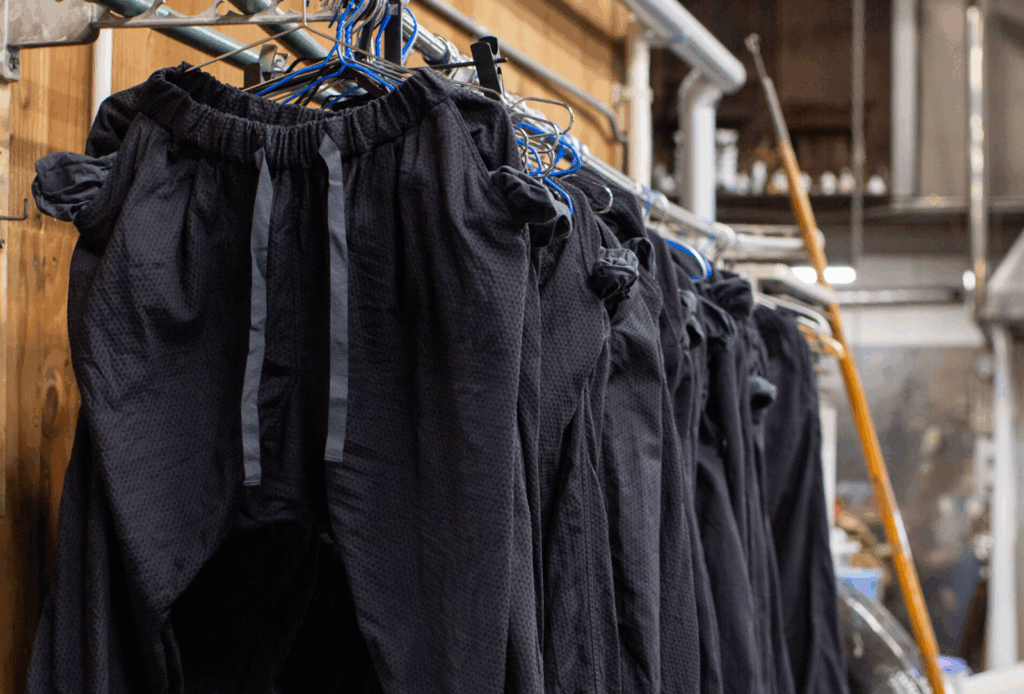
There’s something incredibly satisfying about sharing traditional Japanese crafts and products with the world. In these businesses—both large and small—there’s a sense of thoughtfulness for the end-user that you just don’t find in today’s fast-paced consumer culture. For example, some companies use older looms that take longer to weave fabric but result in pieces that last for decades and develop character over time. The hand-dyeing techniques Kyoya uses mean the indigo color won’t wash away as easily and has a truly unique pattern. Every step of the manufacturing process has a reason, every technique has a history, and every pattern carries a meaning. It feels good to help these businesses expand their outreach and connect with people who appreciate that same depth and lasting quality.

A Lifelong Commitment
When I first moved here, I saw my time as an adventure. But now that my kids are being raised here, Japan is home. My connection to the country has evolved from a temporary one to a lifelong commitment. This has made me think a lot about building bridges, not just for myself, but for my children. I want them to form deep, local connections here while also staying connected to the world abroad.
I’ve realized that’s the same kind of two-way connection I seek for the companies I work with. It’s not about them broadcasting their message at people; it’s about listening to their customers, sharing their stories, and making them feel like a part of the brand’s journey. That’s the kind of long-term relationship that truly matters.
Rural Reflections: JET alum Marshall Hughes shares an unseen side of Japan in his memoir of teaching in the inaka

Posted by: Margie Banin (Kochi-ken, 2005–2007), a former CIR with a love of the written word. Currently she connects others to Japan through translating, writing, and editing texts on Japan. Margie also manages the JETwit Bluesky account, serves as the JETwit Volunteer Coordinator and a JETwit jobs-list welcomer, and engages in various other JETwit outreach activities.
A number of books over the years have been written about the JET (and non-JET) teaching experience in Japan. JET alum Marshall Hughes (Tochigi-ken, 1990–1991; Ibaraki-ken, 1992–1995) has recently added to this genre with Rural Reflections: What 11 Years in Provincial Japan Taught Me. After his four-year JET experience, Hughes taught from 1996 to 2001 in Mitsukaido-shi, Ibaraki-ken, and for 25 years in Japan overall before retiring to Chiba in 2024.
Hughes’ book differs from others in that his book spans eleven years in four cities. He writes familiar stories of the typical ups and downs that all JETs had, but also gets personal with stories of student tragedies and other less-than-glamorous aspects of the JET, and Japan, life. Overall, the book takes a real look at sometimes hard-to-believe experiences with humor and interesting cultural/historical points tossed in.
Hughes says that when he became a JET in the early 1990s, foreigners in his area were “something to gawk at, follow around town on bicycles, and at times to consider less than human.” Still, his love for Japan never faded. In 2013, he returned for a visit to his first city, Yaita-shi in Tochigi-ken, and as he was walking back to his car from the main school where he had taught, he started crying. “A flood of memories came back to me of just how pure-hearted the people were there. Before I went to Yaita, I didn’t know any place on earth where people had such pure hearts.”
For former JETS, especially those from the early years of the program or who lived in rural areas, the book is a nostalgic trip down memory lane.
Of Hughes’ book, author Evan Powell wrote, “In Rural Reflections, Hughes takes us with him on a journey into a rural Japanese culture with which most Americans are unfamiliar. Through his experiences as an English teacher in Japanese schools he encounters cultural differences that are at times charming, puzzling, and occasionally disturbing to typical American sensibilities. He provides us a unique window into a fascinating Japanese culture that we might not otherwise come to appreciate and experience. An utterly charming and engaging read!”
Alumni Profile: Meet Steven Horowitz, JETwit Founder (Aichi-ken, 1992-1994)
.
.
Posted by: Margie Banin (Kochi, 2005-2007), a former CIR with a love of the written word. Currently she connects others to Japan through translating, writing, and editing texts on Japan. Margie also manages the JETwit Bluesky account, serves as the JETwit Volunteer Coordinator and a JETwit jobs-list welcomer, and engages in various other JETwit outreach activities.
Recently the Japan Society of Boston profiled JETwit founder Steven Horowitz in their “Meet JET Alumni” series. Learn about Steven’s experiences as an early JET program participant 1992-1994 in Kariya-shi, Aichi-ken, in his interview with JSB.
Read the full interview here:
https://www.japansocietyboston.org/post/steven-horowitz-aichi-1992-1994

Alumni Profile: Ryan Knight—from JET ALT to Army Bandmaster
Posted by: Margie Banin (Kochi, 2005-2007), a former CIR with a love of the written word. Currently connecting others to Japan through translating, writing, and editing texts on Japan. Margie also serves as the JETwit Volunteer Coordinator and a JETwit jobs-list welcomer, as well as engaging in various other JETwit outreach activities.
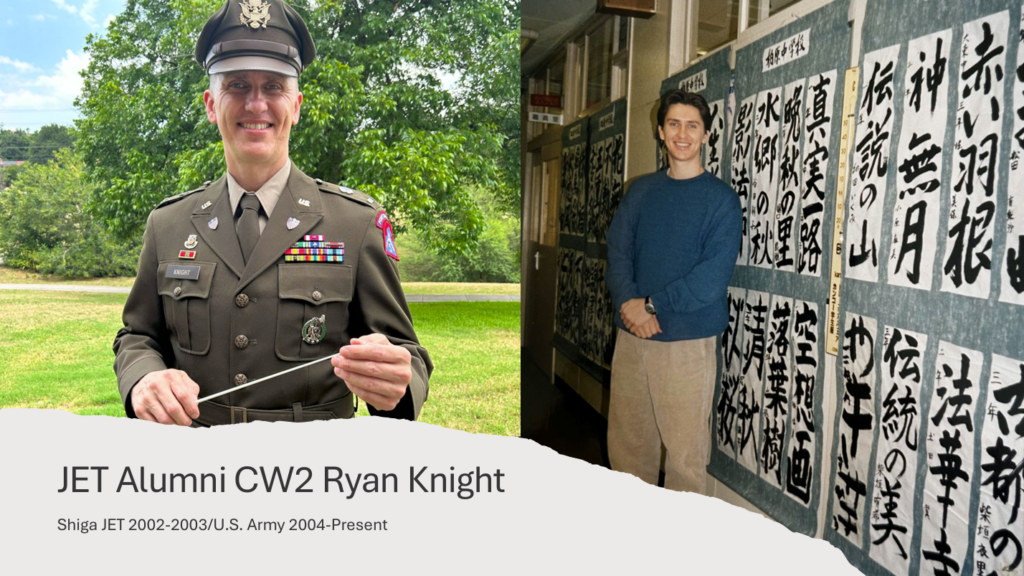
JET alum Ryan Knight (Shiga, 2002-2003) shares his JET story and how his experience living in Japan led him in an unexpected direction.
I had the time of my life as a JET teacher in Shiga Prefecture during the early 2000s. Fresh out of graduate school at Michigan State University with a major in Music Performance, I was ready for a break before pursuing a Doctor of Musical Arts (DMA) degree. At the time, a DMA was essential for securing a teaching position at the university level. The previous summer, I had studied in Shiga Prefecture as an international student—a transformative experience that solidified my desire to return to Japan and immerse myself in its culture.
The early 2000s were simpler times. Social media was non-existent, the internet was in its infancy, and innovations like YouTube, AI, and the iPhone were still years away. My only connection to the world beyond Japan was a small flip phone that could send text messages of about 20 characters. Communicating with family back in the United States required a prepaid phone card costing $30–$40 and a trip to the nearest payphone—quaint by today’s standards.
Even after 23 years, I vividly remember the send-off party organized by the consulate, arriving in Tokyo, staying at the hotel, meeting other JET teachers, and riding the shinkansen for the first time. It was an unforgettable adventure for a young twenty-something fresh out of college. The JET Program is often described as offering vastly different experiences to its participants, but for me, it was nothing short of wonderful. My caring supervisors made the job immensely enjoyable, and the cultural exchange with students and teachers created lifelong memories.
Though I only participated in the JET Program for a year, I stayed in Japan, working at a cram school/private English school. Teaching both children and adults was equally rewarding. However, all good things must come to an end. The need for financial stability loomed, and my out-of-state college loan payments—totaling around $43,000—had become a burden. A musician friend mentioned that the military offered loan repayment programs, with the Navy promising $10,000 and the U.S. Army offering $65,000 for a single tour of 3–4 years. The opportunity to serve as a musician seemed too good to pass up, though my lack of military experience made me hesitant. At the time, there was no YouTube to watch testimonials and the internet provided little guidance.
In 2004, I joined the Army—from Japan, no less. The rest is history. I am set to retire this year after 21 years of active-duty service, during which I proudly served my country across Japan and various stateside locations. Beginning as a saxophonist, I rose through the enlisted ranks to E8/First Sergeant before being selected as a Warrant Officer Bandmaster/Conductor. For the past seven years, I’ve had the privilege of commanding Army Bands in Japan, New York, and now Texas.
As I transition out of military service, I look forward to leveraging my skills, experience, and passion for Japan–U.S. relations in the next chapter of my professional life.
If anyone in the JET community past or present needs anything, please don’t hesitate to reach out!
JET alum Bridget Ryan on working at a Lawson convenience store in Tokyo
****************************************
Post by Bridget Ryan (ALT Shimane-ken, 2021-23)
Up until now, have never had any experience with cosplay or dressing up, but now twice a week I undergo a type of transformation. Since coming to Japan, I’ve thought how nice it would be to work at a convenience store. The employees always treat you so politely and with a smile, so I’ve come to love convenience stores. Last November, this dream became a reality. Twice a week I put on a uniform and work part-time at a convenience store called Lawson. Putting on my uniform, I transition from being a regular international student to a member of Japanese society.
Although I’ve done various part-time jobs and work since middle school, but I’ve never worn a uniform before. When I first put on the Lawson uniform, I understood why uniforms are necessary. Even though I’ve been in Japan for over two years, I still lack confidence speaking Japanese. However, when I wear the uniform, I feel more confident, like I’m part of the team, not just an individual. I confidently operate the cash register and assist customers in Japanese without worry. Additionally, I work with my colleagues to solve problems and keep the store clean and running smoothly.
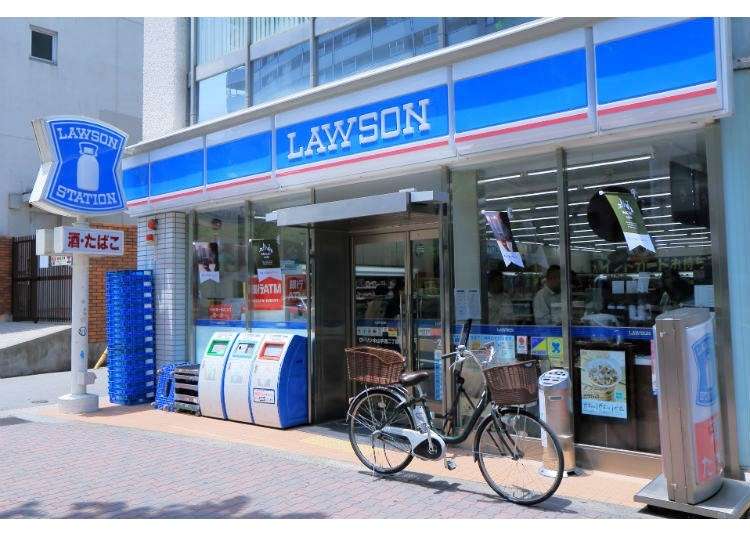
As a result, whether I’m working or not, I feel like I’m participating in Tokyo’s society. Japanese society can be quite uniform, so sometimes, outside of school life, I feel distant from the people in Tokyo. However, thanks to my transformation at the convenience store twice a week, I feel like I’m gradually becoming a part of Tokyo’s society. As long as I continue to live here as a student, I want to continue working part-time.
今までで、コスプレなどの経験がなかったが、週2回、私は変身にしている。日本に来てから、コンビニで働きたいないなと思っていた。いつも笑顔で丁寧に接するので、コンビニのことが大 好きになった。去年11月にこの夢が現実になった。1週間に2回制服を着て、ローソンというコン ビニでアルバイトをやっている。制服を着て、普通の留学生から日本の社会人になる。
中学生の時から色々なアルバイトや仕事をしてきたが、今まで制服を着たことがなかった。初め てローソンの制服を着たところ、ユニフォームを着なければならない理由が分かった。2年間以上 日本にいるのに、まだ日本語で話すことにまだ自信がなかなか持てない。しかし、制服を着ると 自信が出る。個人から、お店のチームに入っていると感じる。気にせずに日本語でレジをした り、お客さんをに手伝ったりする。そして、同僚と問題を解決したり、お店をきれいにしたりす
ることもする。
その結果、アルバイトをする時もしない時も、東京の社会に参加しているという感じを持って る。日本の社会はとても画一的なので、留学生にとって学校以外で東京の人々と距離を感じる時 もある。だが、週2回コンビニでの変身のおかげで、少しずつ東京の社会と距離が縮まるように なった。ここに住み続ける限り、アルバイトを続けたいと思う。

The JETAA-sphere Podcast: Ep 8 – Designer, educator and JETAANY stalwart Lee-Sean Huang (Oita-ken, 2003-06)
*******************************
Designer, educator and longtime JETAANY contributing member Lee-Sean Huang (Oita-ken, Nakatsu-shi, 2003-06) joins Steven Horowitz(Aichi-ken, 1992-94) and Zach Piper (Kochi-ken, 2001-04) to talk about his path to JET and since JET as well as his longtime role as JETAANY Webmaster. Plus hear Leesean singing enka!
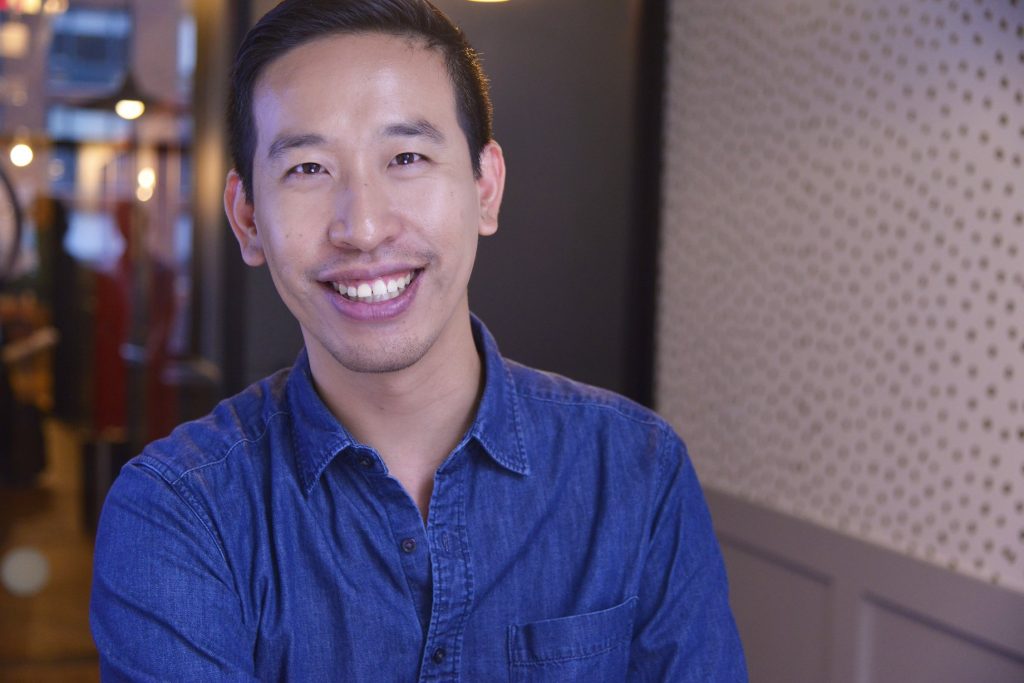
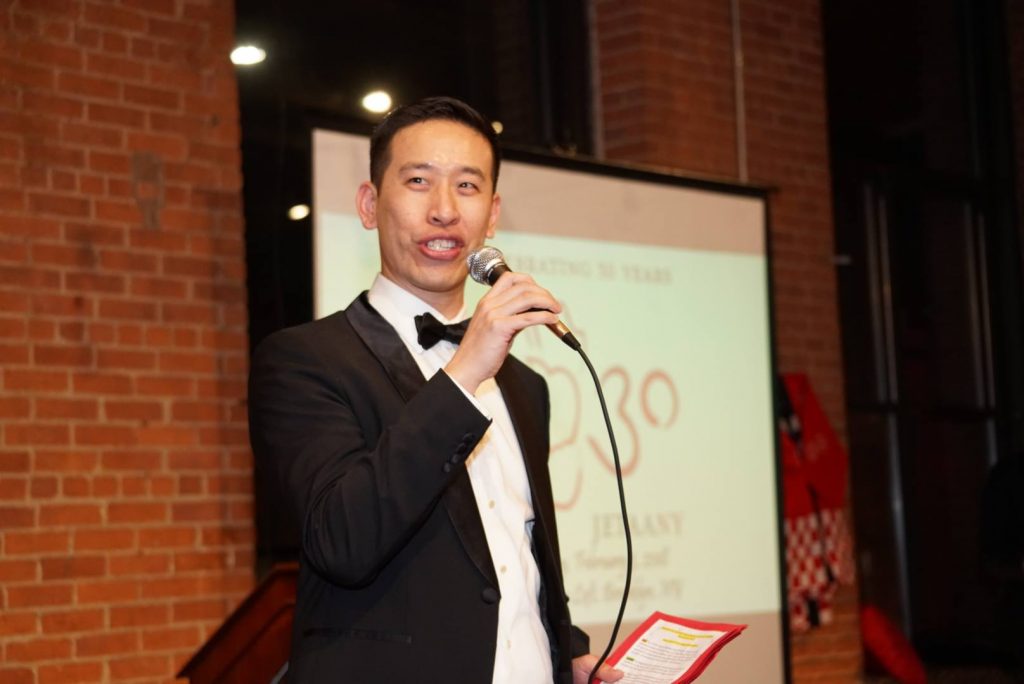
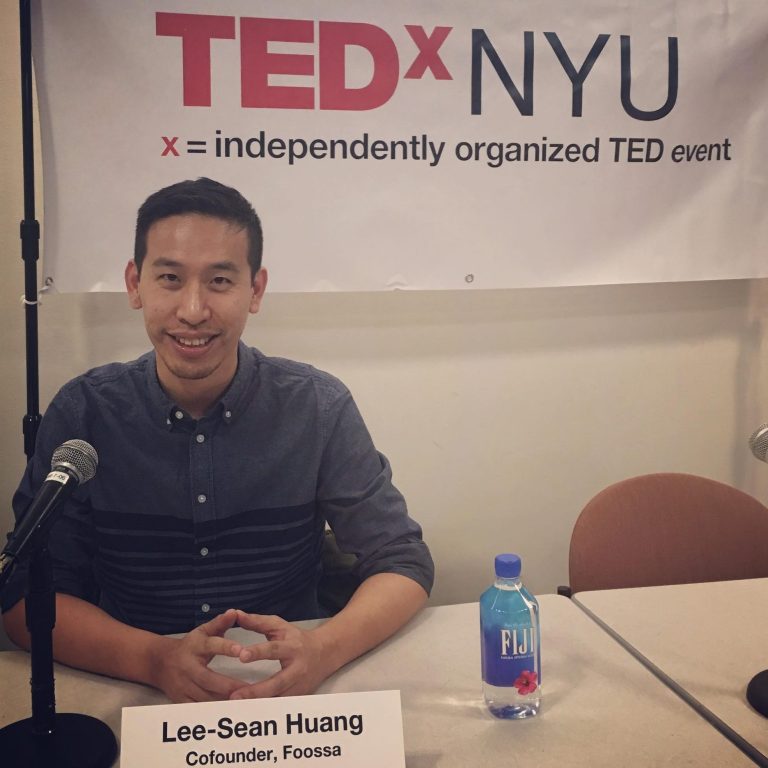
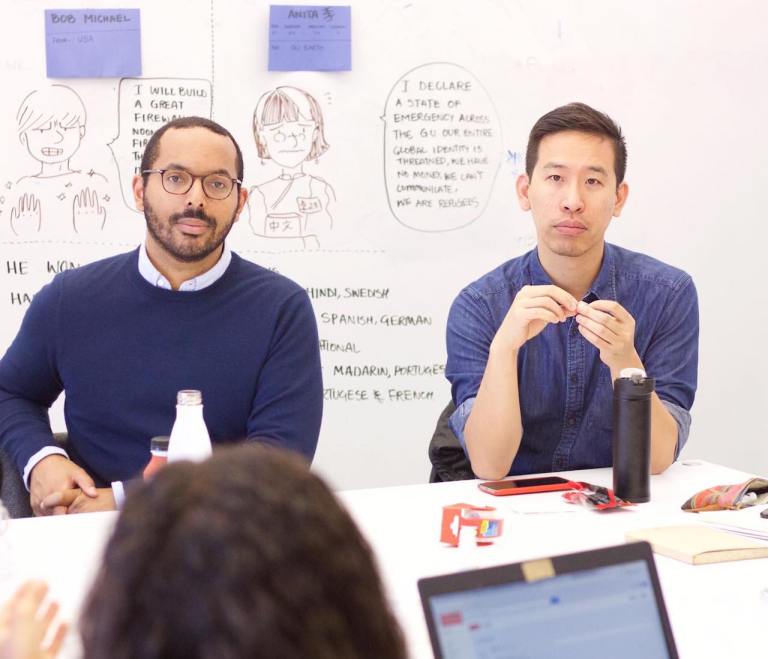
Show Links:
- AIGA: The Professional Association for Design
- AIGA book event: The Impossibility of Silence: Writing for Designers, Artists & Photographers(Q&A by Lee-Sean Huang)
- Leesean.net
- Foossa (Lee-Sean’s design and communications company)
- Jero (famous African American enka singer in Japan)
- Yoppareeikawa: English Nomikai Podcast by Emmalee Manes (Toyama-ken, 2016-19)
- Oda Yori-sensei, Professor of Japanese at Harvard University
- Nakatsu-shi, Oita-ken
- Fukuzawa Yukichi – most famous resident of Naktasu-shi
- Nakatsu, the mecca of fried chicken in Japan
- NYU: Interactive Telecommunications (ITP) Program
- The Kigali Genocide Memorial in Rwanda
- JETwit
- JETAA New York
- Monica Yuki’s JET Alum Zoom Rajio Taisou every Friday, 11:30am (EST)
Other JETs/JET alumni mentioned in this episode:
- Emmalee Manes (Toyama-ken, 2016-19)
- Ramez Kafrouni (Niigata-ken, 2016-18), Webmaster for JETAANY
Credits
- Intro/Ending narration by Rose Horowitz (COJ)*
- Art/Design by Lee-Sean Huang (Oita-ken, 2003-06)
- Podcast hosting on Transistor courtesy of Percival Constantine (Kagoshima-ken, 2008-13)
Comments? Questions? Suggestions?
- Email Steven Horowitz at stevenwaseda@gmail.com
*********
- The JETAA-sphere Podcast is a production of JETwit.com, with special thanks to USJETAA and CLAIR for their support.
- *COJ = Child of JET
The JETAA-sphere Podcast: Ep 7 – Monica Yuki, Jessyca Livingston & James Gannon discuss the JETAA USA Board of Advisors and 3.11
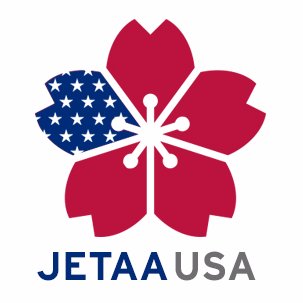
******************
From JETwit Media, it’s the 6th episode of the JETAA-sphere Podcast!
Three members of the JETAA USA Board of Advisors—Monica Yuki (Saitama-ken, 2002-04), Jessyca Livingston, formerly Wilcox (Hokkaido, 2003-06) and James Gannon (Ehime-ken, 1992-94) join Steven Horowitz(Aichi-ken, 1992-94) and special co-host Matt Gillamof CLAIR NY (aka the Japan Local Government Center) to talk about the JETAA USA Board of Advisors–what it is, who’s on it, and how the tragedy of 3/11 became the catalyst for the creation of a Board of Advisors for JETAA USA.

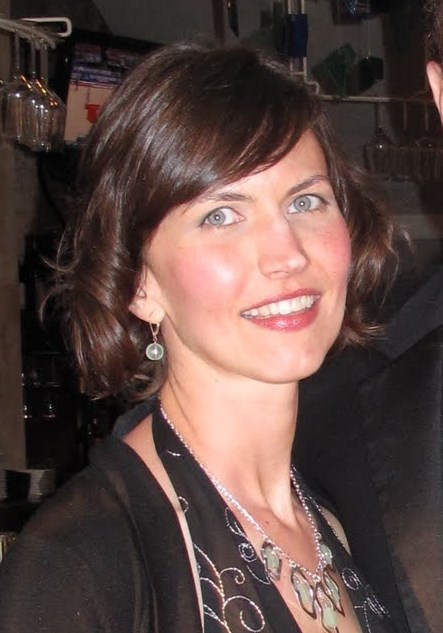

Show Links:
- JETAA USA Board of Advisors
- JETAA USA
- Japan Center for International Exchange (JCIE)
- Toru Kikiwada, Diet Member from Rikuzentakata – “Japanese Politician Recounts Losing Family to Tsunami“
- & fundraising links
- Taylor Anderson Memorial Fund
- Monty Dickson Center, University of Alaska Anchorage
- “JET Program on Chopping Block” by James Gannon via JETwit.com
- JETwit
- JETAA New York
- Monica Yuki’s JET Alum Zoom Rajio Taisou every Friday, 11:30am (EST)
Other JETs/JET alumni mentioned in this episode:
- Paul Yoo (Akita-ken, 2009-2012), Founder of Volunteer Akita and currently living in Ventura, California (working at Patagonia HQ)
- Ryan Hart (Chiba-ken, 1998-99), former JETAA USA Country Rep, former PNW JETAA President
- Mark Frey (Kumamoto-ken, 2002-06), former JETAA USA Country Rep, former JETAA Northern California President & Newsletter Editor
- Cheryl Hou (Toyama-ken, 2005-08), former JETAA USA Country Rep, former PNW JETAA President
- Shree Junk (Shiga-ken, 2005-07), former JETAA USA Country Rep, former JETAA NY Vice-President
- Kelly Nixon, former JETAA NY Treasurer
- Shannan Spisak, former JETAA USA Country Rep, former JETAANY President
- Shannon Quinn, former JETAA USA Country Rep, former PNW JETAA President
- Grant Minagawa, JETAA Southern California Social Chair
- Lisa Gappa-Norris (MEF Gunma-ken, 1982-83)
Credits
- Intro/Ending narration by Rose Horowitz (COJ)*
- Art/Design by Lee-Sean Huang (Oita-ken, 2003-06)
- Podcast hosting on Transistor courtesy of Percival Constantine (Kagoshima-ken, 2008-13)
Comments? Questions? Suggestions?
- Email Steven Horowitz at jetwit@jetwit.com
*********
- The JETAA-sphere Podcast is a production of JETwit.com, with special thanks to USJETAA and CLAIR for their support.
- *COJ = Child of JET
The JETAA-sphere Podcast: Ep 6 – Ryan Hata (AJET, JETAANY, JETAA International, JETwit)
******************
From JETwit Media, it’s the 6th episode of the JETAA-sphere Podcast!
Ryan Hata (Tottori-ken, 2014-17) joins Steven Horowitz (Aichi-ken, 1992-94) to talk about the many hats he wears in the JETAA-sphere–from AJET to JETwit to JETAANY to JETAA International–and his passion for helping JETs find work opportunities and connect with each other and helping the JET alum community continue to grow stronger.



Show Links:
- Ryan Hata on LinkedIn
- AJET & JETAA-I Job Listings Facebook Group
- AJET website
- JETAA Hawaii
- JETAA British Columbia
- JETwit
- JETAA New York
- Monica Yuki’s JET Alum Zoom Rajio Taisou every Friday, 11:30am (EST)
Other JETs/JET alumni mentioned in this episode:
- Bruce Feiler, author of Learning to Bowand many other best-selling books
- Anna Ayvazyan, current AJET Director of Alumni Relations
- Monica Yuki
- Lee-Sean Huang (Oita-ken, 2003-06)
- Teri Galvez, JETAA Rocky Mountain President and creator of many JETAA chapter logos/mascots
- Richard Kei, JETAA Hawaii and former Monbusho English Fellow (MEF)
- Nathalie Ng, JETAA Singapore and also JETAA International Board of Advisors
- Joe Moore, JETAANY and JETAA Southern California Board of Directors
- JET alumni who have worked at Columbia Business School, Jerome A. Chazen Institute for Global Business:
About the JETAA-sphere Co-Hosts:
- Steven Horowitz (Aichi-ken, 1992-94) is the founder of JETwit.com, a member of the JETAA USA Board of Advisors, and a long-time active member of JETAA New York and now JETAA DC.
- Joe Moore (Saga-ken, 2010-13) is a member of the Board of Directors for both JETAA Southern California and JETAA New York and a former Co-President of JETAA Southern California.
- Zach Piper (Kochi-ken, 2001-04) is a member of the Board of Directors for JETAA New York and a long-time active member of JETAA New York.
- Note: All three of them have full-time jobs outside of this. This isn’t how they make a living or put food on the table.
Credits
- Intro/Ending narration by Rose Horowitz (COJ)*
- Art/Design by Lee-Sean Huang (Oita-ken, 2003-06)
- Podcast hosting on Transistor courtesy of Percival Constantine (Kagoshima-ken, 2008-13)
Comments? Questions? Suggestions?
- Email Steven Horowitz at stevenwaseda@gmail.com
*********
- The JETAA-sphere Podcast is a production of JETwit.com, with special thanks to USJETAA and CLAIR for their support.
- *COJ = Child of JET
The JETAA-sphere Podcast: Ep 5 – Adam Lisbon, JETAA Rocky Mountain
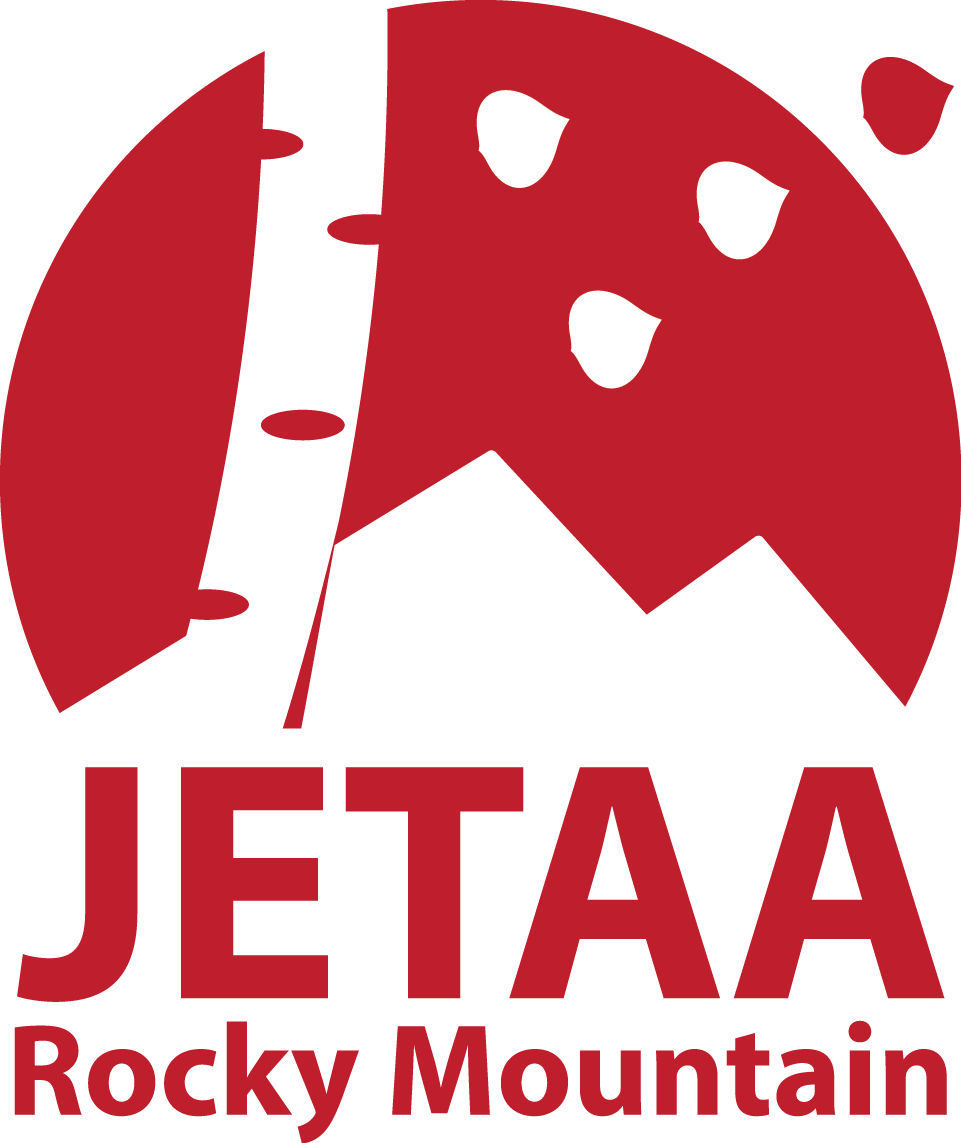
******************
From JETwit Media, it’s the 5th episode of the JETAA-sphere Podcast!
Former JETAA Rocky Mountain chapter president Adam Lisbon (Kobe-shi, 2004-07) joins Zach Piper (Kochi-ken, 2001-04) and Steven Horowitz(Aichi-ken, 1992-94) to talk about JETAA Rocky Mountain, his work as Japanese & Korean Studies Librarian at the University of Colorado Boulder, Colorado’s Japanese-American history, and JET days of yore.
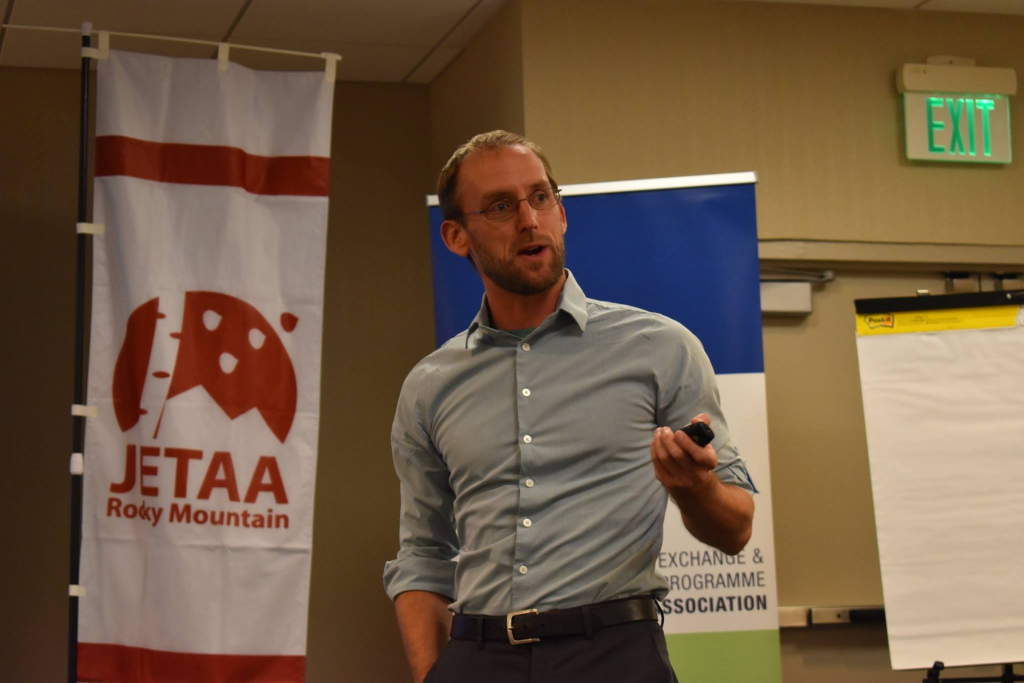
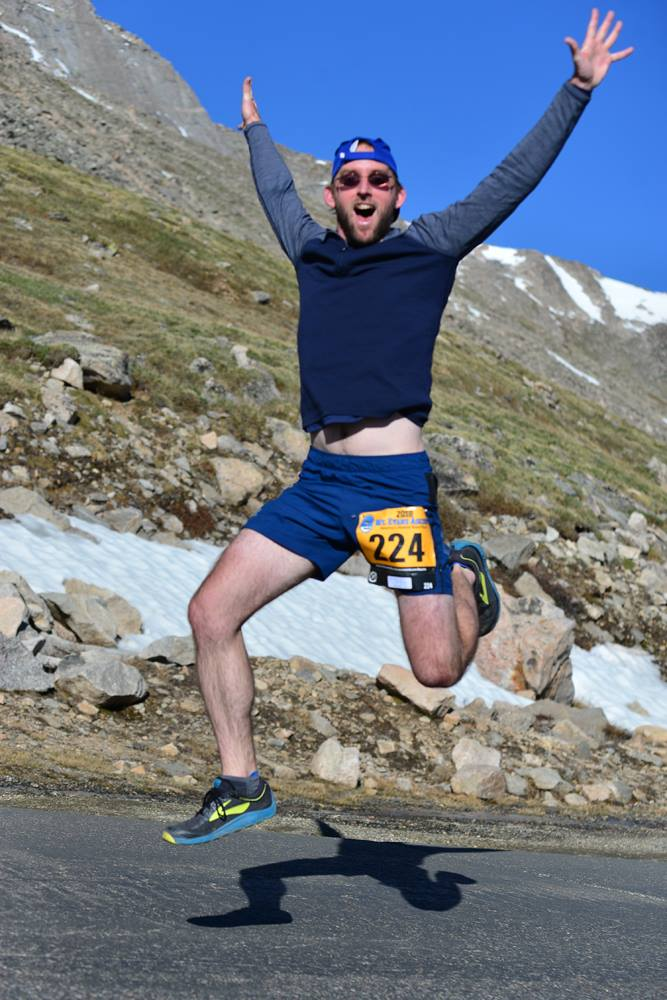
Show Links:
- JETAA Rocky Mountain
- Japanese and Japanese-American Community History Project
- Video about the Project
- Digital Archive of the CU Japanese and Japanese American Community History Project
- Paige Cottingham-Streater, Executive Director, Japan-US Friendship Commission
- JETwit
- JETAA New York
- Monica Yuki’s JET Alum Zoom Rajio Taisou every Friday, 11:30am (EST)
About the JETAA-sphere Co-Hosts:
- Steven Horowitz is the founder of JETwit.com, a member of the JETAA USA Board of Advisors, and a long-time active member of JETAA New York and now JETAA DC.
- Joe Moore is a member of the Board of Directors for both JETAA Southern California and JETAA New York and a former Co-President of JETAA Southern California.
- Zach Piper is a member of the Board of Directors for JETAA New York and a long-time active member of JETAA New York.
- Note: All three of them have full-time jobs outside of this. This isn’t how they make a living or put food on the table.
Credits
- Intro/Ending narration by Rose Horowitz (COJ)*
- Art/Design by Lee-Sean Huang (Oita-ken, 2003-06)
- Podcast hosting on Transistor courtesy of Percival Constantine (Kagoshima-ken, 2008-13)
Comments? Questions? Suggestions?
- Email Steven Horowitz at jetwit@jetwit.com
*********
- The JETAA-sphere Podcast is a production of JETwit.com, with special thanks to USJETAA and CLAIR for their support.
- *COJ = Child of JET
The JETAA-sphere Podcast: Ep 3, Part 1 – Matt Gillam (CLAIR) and Bahia Simons-Lane (USJETAA)
******************

From JETwit Media, it’s the 3rd episode of the JETAA-sphere Podcast!
Matthew Gillam of CLAIR NY (aka the Japan Local Government Center) and Bahia Simons-Lane (Gunma-ken, 2005-07), Director of USJETAA join Steven Horowitz (Aichi-ken, 1992-94) and Joe Moore (Saga-ken, 2010-13) about what CLAIR and USJETAA are, what they do, how they support JETAA USA, and how they each ended up in their current roles. (Don’t worry. It’s more fun than it sounds.)

The JETAA-sphere Podcast is (finally) available on Apple, Spotify, Stitcher, Overcast, and anywhere else you might download podcasts from.
To listen to other podcasts by JETs and JET alumni, check out the JETAA Podcast Roundup by Scot Maupin (Hokkaido, 2005-09).
Show Links:
- Japan Local Government Center (aka CLAIR NY)
- CLAIR (Council of Local Authorities for International Relations)
- USJETAA
- JET30 Reunion
- JETAA Florida
- Paige Cottingham-Streater, Executive Director, Japan-US Friendship Commission
- JETwit
- JETAA New York
- JETAA Southern California
- Monica Yuki’s JET Alum Zoom Rajio Taisou every Friday, 11:30am (EST)
Credits
- Intro/Ending narration by Rose Horowitz (COJ)*
- Art/Design by Lee-Sean Huang (Oita-ken, 2003-06)
- Podcast hosting on Transistor courtesy of Percival Constantine (Kagoshima-ken, 2008-13)
Comments? Questions? Suggestions?
- Email Steven Horowitz at jetwit@jetwit.com
*********
- The JETAA-sphere Podcast is a production of JETwit.com, with special thanks to USJETAA and CLAIR for their support.
- *COJ = Child of JET
Krewe of Japan Podcast S02E14-15 – Mastering Japanese Pitch-Accent ft. Dogen (Parts 1 & 2)
Posted by: Doug Tassin (Fukushima-Ken ALT, 2007-2010 & Krewe of Japan Podcast Co-Host)

Last week on the Krewe of Japan Podcast…
The whole Krewe sits down with famous comedian and Youtuber (and former JET Program participant in Oita Prefecture), Dogen! In Part 1, Dogen shares his background including how he became interested in Japan and its culture, his background in martial arts tricking, early attempts at learning Japanese, his path to writing comedy in Japanese, and so much more.
This week…
Nigel, Jenn, & Doug conclude their awesome discussion with comedian and Youtuber, Dogen! In Part 2, the Krewe joins Dogen as they embark on a deep dive into learning Japanese. This discussion takes them to many places from discovering the meaning of pitch accent and how to study effectively, to setting appropriate goals and hilarious language learning stories. This is an episode you don’t want to miss!
The Krewe of Japan Podcast is a weekly episodic podcast sponsored by the Japan Society of New Orleans. Check them out every Friday afternoon around noon CST on Apple, Google, Spotify, Amazon, and Stitcher. Want to share your experiences with the Krewe? Or perhaps you have ideas for episodes, feedback, comments, or questions? Let the Krewe know by e-mail at kreweofjapanpodcast@gmail.com or on social media (Twitter: @kreweofjapan, Instagram: @kreweofjapanpodcast, Facebook: Krewe of Japan Podcast Page, & the Krewe of Japan Youtube Channel). Until next time, enjoy!
Celebration of JET Alumni – October 28
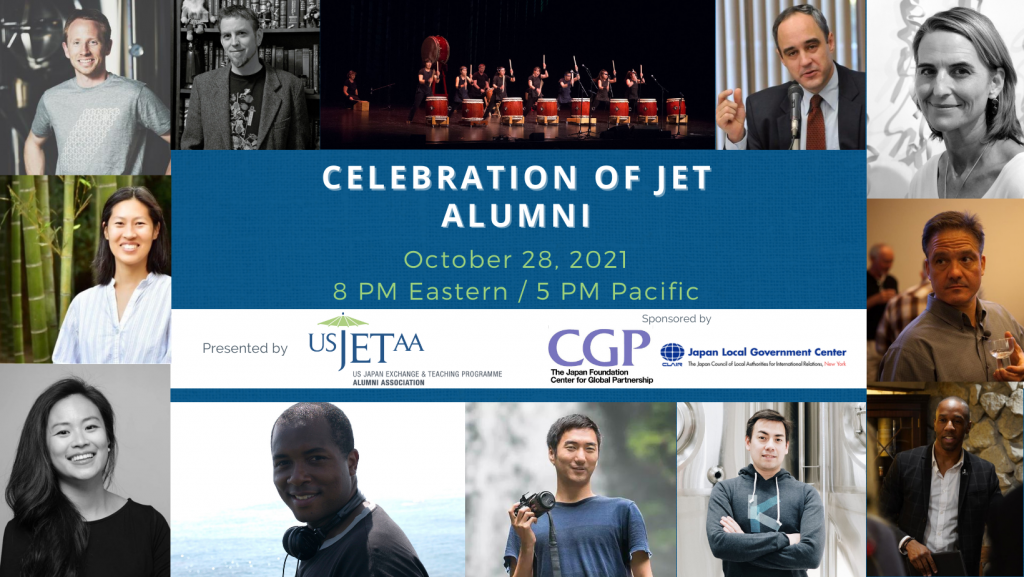
October 28 at 8 PM ET / 7 PM CT / 5 PM PT
Japan time: October 29 at 9 AM JT
Register free to get the access link:
https://usjetaa.wildapricot.org/event-4528144
In the lead up to next year’s 35th anniversary of the JET Program, join USJETAA for a creative program celebrating JET through the success of the alumni. Highlighting the contributions of JETs to the U.S.-Japan community, this variety show brings together the diverse community of JET alumni with snapshots into their experiences with arts, culture, research, and more!

